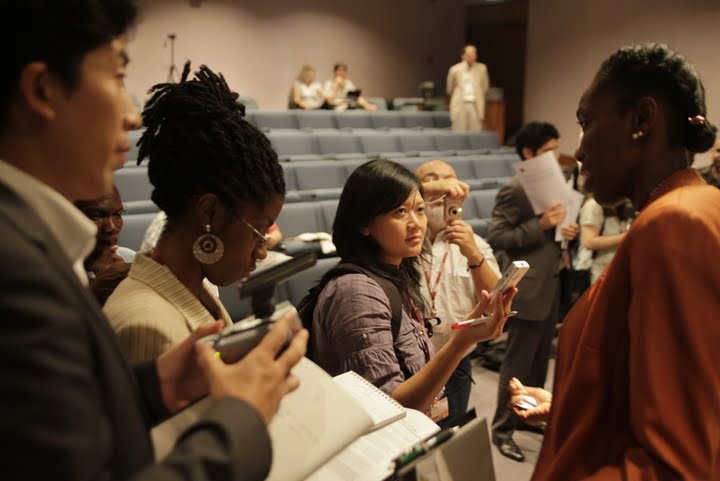By: Irwan Julianto and Mićo Tatalović
Send to a friend
The details you provide on this page will not be used to send unsolicited email, and will not be sold to a 3rd party. See privacy policy.
The Maldives has become a media darling through reports on the impacts of climate change on small island developing states. But this misses out on many others — most notably in the Pacific — that are at the forefront of bearing impacts of climate change, but receive little coverage on the issues they face, the WCSJ 2013 heard yesterday.
Climate change reporting in and about Pacific island region is pretty dismal, according to an analysis of local and UK newspapers presented at the conference.
With just a handful of journalists working on newspapers in the tiny island nations, there is little time to devote to writing about the impacts of climate change and how people adapt to it, said Lagipoiva Cherelle Jackson, editor of IISD Reporting Services, in Samoa.
Yet, she said, if a story gets written, it will probably be included in the newspaper, as the paper has to be filled — and with stretched staff, stories are valuable.
“There is little time to devote to writing about the impacts of climate change and how people adapt to it”
Lagipoiva Cherelle Jackson
But the challenge is how to get overworked and underpaid journalists to write about climate change, a difficult issue to understand and report on comprehensively. The lack of detailed, local data on climate change also hampers the chances of such stories being written in the region.
Internet access is expensive, with an hour of surfing sometimes costing as much as an hour's pay in the region, which adds another barrier to writing stories about climate that often need detailed investigation to get the facts and data right.
Expensive Internet access also means that online news is not as influential as print in the region, she said.
So how do you get more climate change reporting in the region? One way is to encourage foreign media to write about the issue in the Pacific, which can then be picked up by local newspapers. Other recommendations include providing more training to journalists and editors in the region.
Link to full study
Mićo Tatalović
Beware of smokescreens
The role of the media and science journalists in informing the public about controversial issues — and how this role can be manipulated — has been a hot topic during the conference.
When experts present conflicting opinions, how can journalists know whether such conflicts are genuine or whether they have been manipulated by vested interests?
One example that particularly stuck out for me was presented by Louis Kyriakoudes, a historian at the University of Southern Mississippi.
Kyriakoudes discussed the tobacco industry's efforts to manipulate media coverage of the science of tobacco and how it affects health in an attempt to influence public thinking on the effects of cigarette smoking.
He highlighted the long history of tobacco industries in the United States since the introduction of the Camel cigarette by tobacco company RJ Reynolds in North Carolina in 1913 — exactly a century ago.
Since then, as we know, the production and consumption of tobacco has become a controversial public debate around the world.
Kyriakoudes said that tobacco companies in the United States tried hard to survive under the pressure of public health debates — following findings that cigarettes were addictive, carcinogenic and caused hazards not only to the smokers themselves but also to passive smokers — and litigations.
But tobacco and cigarettes were not merely public health issues, he said, but a political and economic one. When the pressure grew too much, tobacco companies struck back by hiring reputable PR agencies and industrial law firms to try and convince the public that cigarettes were safe and not addictive as they had been led to believe by media reports. They also promoted Joe Camel, an 'icon' created by RJ Reynolds to attract adolescents to smoking.
Companies even went as far as to sponsor scientists to create discourse that individuals had the freedom and right to choose whether or not to smoke.
All of this put the media in a difficult position with regards to what to report on, further compounded by issues such as cigarette advertisements and the fate of tobacco plantations in several states such as North Carolina.
A book, Tobacco Capitalism — written by anthropologist Peter Benson and published in 2012 — further explores the history of tobacco plantations in this state.
Irwan Julianto, Wellcome Trust funded intern














